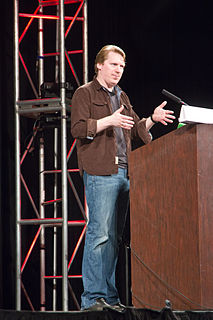A Quote by Paul Davies
It's worth remembering that all technology leaves a footprint. For example, our own technology is leaving a footprint in terms of global warming, which could be detected from a long way away. One assumes that a very advanced civilization that has been around maybe millions and millions of years would have an even bigger footprint that might extend beyond its planet to its immediate astronomical environment.
Quote Topics
Advanced
Advanced Civilization
Around
Away
Been
Beyond
Bigger
Civilization
Could
Environment
Even
Example
Extend
Footprint
For Example
Global
Global Warming
Immediate
Leaves
Leaving
Long
Long Way
Maybe
Might
Millions
Our
Own
Planet
Remembering
Technology
Terms
Very
Warming
Way
Which
Worth
Would
Years
Related Quotes
We're starting with our own carbon footprint. Not nothing. But much of what we're doing is already, or soon will be, little more than the standard way of doing business. We can do something that's unique, different from just any other company. We can set an example, and we can reach our audiences. Our audience's carbon footprint is 10,000 times bigger than ours... That's the carbon footprint we want to conquer.
We are living as if we had three planets' worth of resources to live with rather than just one. We need to cut by about two-thirds our ecological footprint. For that we need one planet farming as well as one planet living - one planet farming which minimises the impact on the environment of food production and consumption, and which maximises its contribution to renewal of the natural environment
We are and remain such creeping Christians, because we look at ourselves and not at Christ; because we gaze at the marks of our own soiled feet, and the trail of our own defiled garments.... Each, putting his foot in the footprint of the Master, and so defacing it, turns to examine how far his neighbor’s footprint corresponds with that which he still calls the Master’s, although it is but his own.
Although reducing human emissions to the atmosphere is undoubtedly of critical importance, as are any and all measures to reduce the human environmental "footprint", the truth is that the contribution of each individual cannot be reduced to zero... If we believe that the size of the human "footprint" is a serious problem (and there is much evidence for this) then a rational view would be that along with a raft of measures to reduce the footprint per person, the issue of population management must be addressed.
We see a world of abundance, not limits. In the midst of a great deal of talk about reducing the human ecological footprint, we offer a different vision. What if humans designed products and systems that celebrate an abundance of human creativity, culture, and productivity? That are so intelligent and safe, our species leaves an ecological footprint to delight in, not lament?
Cities, in many ways, are the best repositories for a love affair. You are in a forest or a cornfield, you are walking by the seashore, footprint after footprint of trodden sand, and somehow the kiss or the spoken covenant gets lost in the vastness and indifference of nature. In a city there are places to remind us of what has been.
You have to realize that, about 20,000 years ago, there was a cataclysmic event when an entire rock face collapsed and sealed off the cave. It's a completely preserved time capsule. You've got tracks of cave bears that look like they were left yesterday, and you've got the footprint of a boy who was probably eight years old next to the footprint of a wolf.
We're living in a time where movies are very unimportant. They're not leaving a footprint on your heart. We're going to the movies now and we're going, "Oh, man, that was cool! That was thrilling! That was a ride!" But, we're not walking away anymore thinking, "I just experienced something that could change the way I live."
In terms of sustainability and what we eat and what its footprint is on the environment and the consequences of eating one thing versus another, obviously it makes a lot of sense to be eating insects. They're incredibly plentiful. They've got a very short turnover rate. You could be eating termites.






































